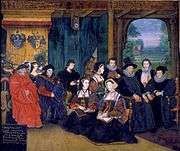Rowland Lockey

Rowland Lockey (c. 1565–1616) was an English painter and goldsmith. The son of Leonard Lockey,[1] a crossbow maker of the parish of St Bride's, Fleet Street, London, Lockey was apprenticed to Queen Elizabeth's miniaturist and goldsmith Nicholas Hilliard[2] for eight years beginning Michaelmas 1581[1] and was made a freeman or master of the Worshipful Company of Goldsmiths by 1600.[3]
He worked mainly as a copyist of earlier portraits to make up sets of oil paintings for the fashionable long galleries of great houses,[3] but signed or documented portrait miniatures on vellum and a signed title page engraving for the 1602 Bishops' Bible also survive.[4]
Versions of Holbein's More family


He is best known for his two near life-size copies from the early 1590s of the now-lost Family of Sir Thomas More (1527) by Hans Holbein the Younger at Nostell Priory and the National Portrait Gallery in London - the original was destroyed by fire in the eighteenth century.[3] These differ considerably, as the London version, Sir Thomas More, his father, his household and his descendants, includes More's descendants in their contemporary dress but omits several of the figures in the Holbein original. This was painted around 1593, probably commissioned by More's grandson, Thomas More II, to commemorate five generations of the family. The four figures wearing ruffs and holding prayer books on the right are Thomas More II, his wife and their oldest and youngest sons. Anne More, née Cresacre (1511–77), was Sir Thomas's daughter-in-law, and appears twice: once copied from the Holbein as a young woman of about sixteen (between Sir Thomas and his father) and also as an older woman in the painting on the rear wall.[5] A cabinet miniature version of this portrait c. 1594 with different details, also likely by Lockey, is in the Victoria and Albert Museum.[3][6] There is also a surviving drawing by Holbein which confirms the general accuracy of the Nostell Priory version.
Two further copies of the Holbein, at Old Chelsea Town Hall and Hendred House, East Hendred, may be by Lockey, but are too damaged and over-painted for any certainty to be possible.[7]
Other paintings
01.jpg)
His signed portrait of Lady Margaret Beaufort, mother of Henry VII, was presented to St John's College, Cambridge in 1598,[3] and a portrait of King James I of England as a young boy, now in the National Portrait Gallery, London, based on a 1574 painting by Arnold Bronckorst, is also attributed to Lockey[8][9]
Lockey was long associated with the Cavendish family of Hardwick Hall, working under the patronage of Bess of Hardwick between 1591 and 1597 and of her son Sir William Cavendish between 1608 and 1613.[1][10]
The art historian Sir Roy Strong has identified a number of inferior copies of Hilliard's portrait miniatures as probably the work of Lockey, pointing out their "weak and laboured brushstrokes" and "smudgy" features.[11] Strong concludes that while Lockey was of "no significance as an artist"[12] when compared to his brilliant fellow-apprentice to Hilliard Isaac Oliver, his importance lies in carrying Hilliard's aesthetic into the next generation.
See also
| Wikimedia Commons has media related to Rowland Lockey. |
Notes
- 1 2 3 Lewis, p. 8-9
- ↑ "Rowland Lockey." The Concise Grove Dictionary of Art, Oxford University Press, Inc., 2002. Answers.com 1 November 2008. http://www.answers.com/topic/rowland-lockey-1
- 1 2 3 4 5 Strong 1969, p. 255.
- ↑ Strong 1983, p. 136-140
- ↑ "NPG 2765 Sir Thomas More, his father, his household and his descendants". Retrieved 2008-11-01.
- ↑ V&A Museum
- ↑ Lewis, p. 9
- ↑ "NPG 63 King James I of England and VI of Scotland". Retrieved 2008-11-01.
- ↑ The painting of James I was formerly at Hardwick Hall; see Strong 1983 p. 258. It is based on, but not a copy of, the Bronckorst; compare Image:James VI as a boy (Arnold Bronckorst).jpg (Strong 1983 plate 92)
- ↑ Strong, 1969
- ↑ Strong 1983, p. 140
- ↑ Strong 1983, p. 141
References
- Hearn, Karen, ed. (1995).Dynasties: Painting in Tudor and Jacobean England 1530-1630. New York, Rizzoli. ISBN 0-8478-1940-X.
- Lesley Lewis (1998). "Rowland Lockey (1565/7–1616)". The Thomas More Family: Group Portraits After Holbein. Gracewing Publishing. Retrieved 2008-11-02. ISBN 0-85244-466-4
- Strong, Roy (1969). The English Icon: Elizabethan and Jacobean Portraiture, London, Routledge & Kegan Paul
- Strong, Roy (983). The English Renaissance Miniature, New York, Thames and Hudson, ISBN 0-500-23370-5
